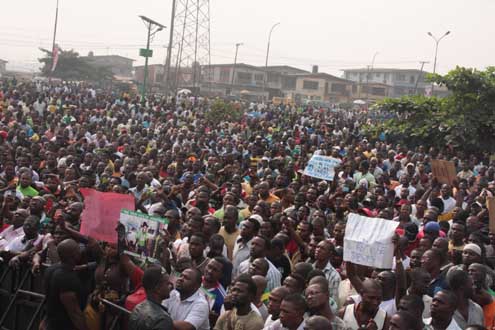
The burning issue in Nigeria today apart from the incessant attacks of insurgents like Boko Haram is the increase in petrol taxes or fuel subsidy removal depending on who you would believe. As it is today, there are just as many moral questions to ask as there are economic questions. Questions are a function of information and based on that Nigeria leaves you asking more questions than finding answers.
The questions Nigerians are asking their government is simple enough: if truly government is as broke as it claims, why does it insist on spending public funds like it is rich? This question is credible. Nigerian public officers are the highest earners in the world. Nigeria's Senate President earns $3.7 million in salaries and allowances every year. The other 459 members of the national assembly each cost tax payers $2.1 million per year. A Nigerian Governor spends as much as $1.5billion per year on the pretense of "security votes" despite security being a separate line item in the budget. The President and his Vice-President have a line in the 2012 budget saying "welfare" that cost the people $4million. The budget is littered with wastes like the ones stated here. These are the reasons Nigerians are insisting that the claims of a 207.7 per cent increase in the price of petrol is a question of taxes not of removing subsidy as there are claims yet to be denied by the government that even at N65 ($0.43) the government was already making as much as $0.17 on each litre of petrol sold. The commodity now sells for as much as $1.33 from $0.43
While government claims it was subsidising consumption until the turn of the year, there are professionals and indeed former honchos of the petroleum ministry claiming that there was indeed no subsidy in the first place. This has left the country in a stalemate. The Nigerian question is a major issue essentially because information is a scarce commodity. While all of these continue, attention has been drawn to the cost of governance and the size of government. This is responsible for the fact that Nigeria’s current budget had as much as 76 per cent dedicated to recurrent expenditure out of which 25 per cent helps to pay the salaries of national lawmakers.
Nigerians are questioning the morality of public office holders who increasingly increase their salaries and allowances year on year, employ more aides year on year while raising taxes on all fronts claiming the country is broke. Since 2010, the current government as led by President Goodluck Jonathan has spent $63.7billion. That is a lot of money in Nigeria. The fact that everything is just as bad if not worse than in previous years essentially means that that is money gone down the drain. Nigerians are angry. They are angry not because these government waste is a new thing, they are angry because unlike in times past, they now have access to information. For the first time in the history of the country, Nigerians are discussing the 2012 budget even before the country’s law makers have had a seating on it.
There are agitations for a new spending regime. There are demands for a full deregulation of the petroleum sector as it is currently run by a monopoly called the Nigerian National Petroleum Corporation (NNPC) which is run by political rent seekers and their cronies. The Petroleum Industry Bill (PIB) which if/when passed into law will allow for the full deregulation of the sector, remains stalled at the National Assembly over three years since it was raised at the House.
The government says there is a cabal that sabotages its efforts at cleaning up the sector. The cabal remains because the government being a beneficiary of the underhanded scheming of the cabal has turned a blind eye to the crime and the criminals it admits exist.
As the debates and agitations rage , it becomes crucial for everyone to come clean. Information is being hoarded, secrecy is the norm and lies are a pastime. How can you have freedom in darkness? How can you run a free market when the fundamental factor of free markets i.e. information remains a scarce commodity? As long as the Nigerian government retains its unwritten policy of secrecy, its half-hearted efforts at liberalising the petroleum industry will remain just that: Effort without result because you cannot build a house on lies, you cannot preach freedom while keeping information under lock and key.
Nigeria is a member of OPEC and Africa’s number one exporter of petroleum.
